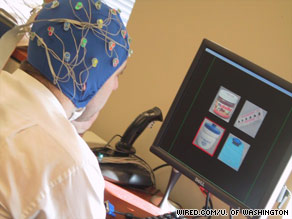Hackers who commandeer your computer are bad enough. Now scientists worry that someday, they'll try to take over your brain.
the past year, researchers have developed technology that makes it possible to use thoughts to operate a computer, maneuver a wheelchair or even use Twitter -- all without lifting a finger. But as neural devices become more complicated, and go wireless, some scientists say the risks of "brain hacking" should be taken seriously.
"Neural devices are innovating at an extremely rapid rate and hold tremendous promise for the future," said computer security expert Tadayoshi Kohno of the University of Washington.
"But if we don't start paying attention to security, we're worried that we might find ourselves in five or 10 years saying we've made a big mistake."
Hackers tap into personal computers all the time. But what would happen if they focused their nefarious energy on neural devices, such as the deep-brain stimulators used to treat Parkinson's and depression, or electrode systems for controlling prosthetic limbs?
According to Kohno and his colleagues, who published their concerns July 1 in Neurosurgical Focus, most devices carry few security risks. But as neural engineering becomes more complex and more widespread, the potential for security breaches will mushroom.
"It's very hard to design complex systems that don't have bugs," Kohno said. "As these medical devices start to become more and more complicated, it gets easier and easier for people to overlook a bug that could become a very serious risk. It might border on science fiction today, but so did going to the moon 50  years ago."
years ago."
Some might question why anyone would want to hack into someone else's brain, but the researchers say there's a precedent for using computers to cause neurological harm. In November 2007 and March 2008, malicious programmers vandalized epilepsy support Web sites by putting up flashing animations, which caused seizures in some photo-sensitive patients.
"It happened on two separate occasions," said computer science graduate student Tamara Denning, a co-author on the paper. "It's evidence that people will be malicious and try to compromise peoples' health using computers, especially if neural devices become more widespread."
In some cases, patients might even want to hack into their own neural device. Unlike devices to control prosthetic limbs, which still use wires, many deep brain stimulators already rely on wireless signals. Hacking into these devices could enable patients to "self-prescribe" elevated moods or pain relief by increasing the activity of the brain's reward centers.
Despite the risks, Kohno said, most new devices aren't created with security in mind. Neural engineers carefully consider the safety and reliability of new equipment, and neuroethicists focus on whether a new device fits ethical guidelines. But until now, few groups have considered how neural devices might be hijacked to perform unintended actions. This is the first time an academic paper has addressed the topic of "neurosecurity," a term the group coined to describe their field.
Wired
Read Entire Article
Prison Planet.com
© Copyright .
Forex Press Blogger Template Designed by Jinsona Design | Blogger XML Coded By CahayaBiru.com
Forex Press Blogger Template Designed by Jinsona Design | Blogger XML Coded By CahayaBiru.com














0 comments